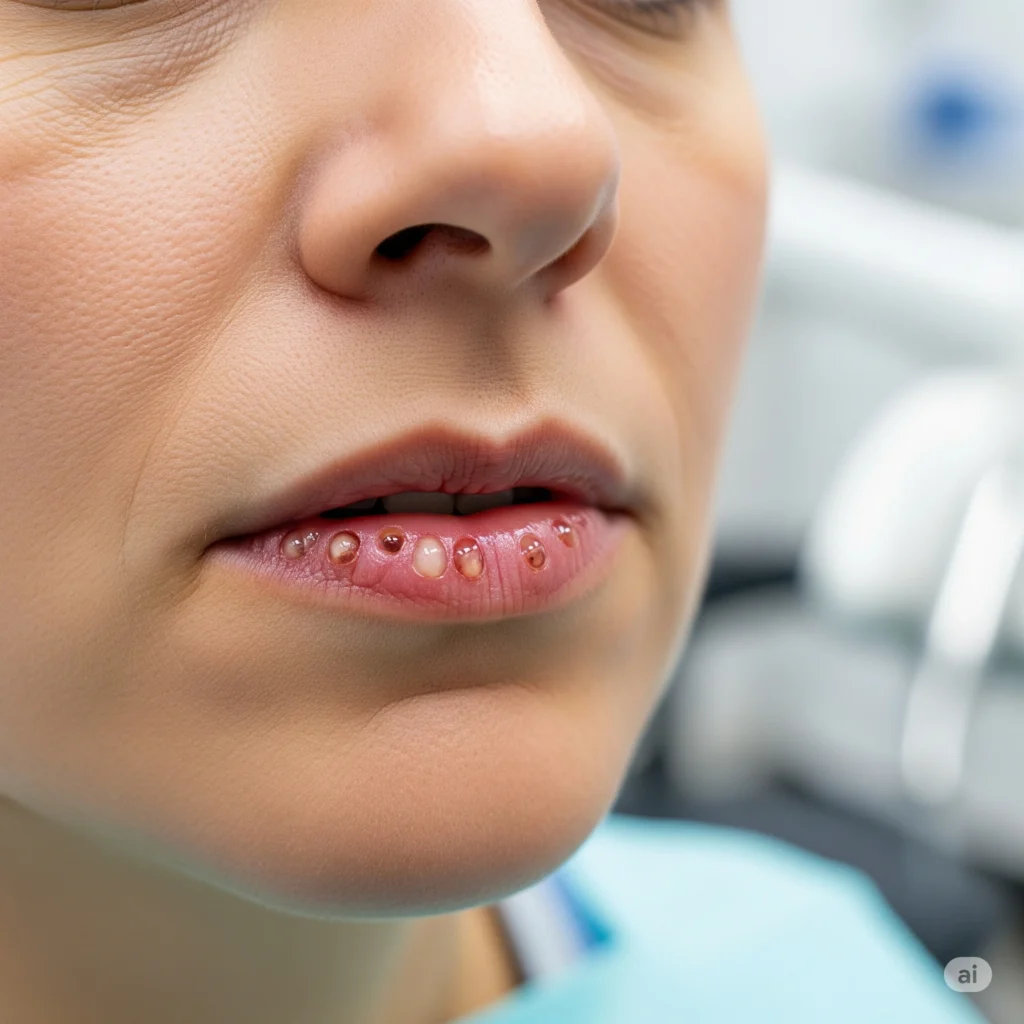Painful blisters on lips can be uncomfortable, unsightly, and sometimes even a sign of an underlying health issue. These fluid-filled sores often appear suddenly and may cause burning, itching, or tenderness. While they can result from several conditions, identifying the cause is essential for proper treatment and prevention. Knowing the triggers, early symptoms, and treatment options can help you heal faster and avoid future outbreaks.
Lip blisters form when the skin becomes inflamed or damaged, leading to fluid accumulation beneath the surface. The most common lip blister causes include:
1. Cold Sores (Herpes Simplex Virus)
Cold sores are the main cause of painful blisters on lips. Caused by the herpes simplex virus (HSV-1), they begin as tingling spots before developing into fluid-filled sores. Cold sores are contagious and can spread through direct contact, such as kissing or sharing utensils.
2. Allergic Reactions
Certain foods, skincare products, or medications can trigger allergic reactions that result in lip swelling and blistering. Common irritants include lipsticks, flavored toothpaste, and spicy foods.
3. Sunburn and Weather Exposure
Overexposure to sunlight or extreme weather can damage lip skin, leading to dryness, peeling, and blister formation.
4. Mouth Injuries
Biting your lip, dental procedures, or irritation from braces can cause localized trauma that develops into blisters.
5. Infections and Autoimmune Conditions
Fungal or bacterial infections, as well as autoimmune disorders like pemphigus vulgaris, may cause persistent blisters.

Though symptoms differ based on the cause, many people notice:
Recognizing these signs early can help you start cold sore treatment or other remedies before symptoms worsen.
Treatments depend on the underlying cause, but the main goals are to reduce discomfort, promote healing, and prevent spreading.
1. Antiviral Medications
For cold sores, doctors often recommend antiviral creams or oral medications such as acyclovir or valacyclovir. Starting treatment at the first sign of tingling is most effective.
2. Over-the-Counter Pain Relief
Topical ointments containing benzocaine or lidocaine can numb the area, reducing pain during eating or talking.
3. Natural Home Remedies
Some people find relief from applying cold compresses, aloe vera gel, or honey to the affected area. These can soothe irritation and keep the blister moisturized.
4. Avoiding Irritants
If your blister is due to an allergic reaction, eliminating the triggering substance is essential. Choose fragrance-free lip care products and avoid spicy or acidic foods until the blister heals.
While not all blisters are avoidable, certain habits can lower your risk:
Adopting a nutrient-rich diet can also help, as foods high in vitamins A, C, and E support healthy skin regeneration. Avoid smoking, which can slow healing and increase lip dryness. Regularly replacing old lip products and cleaning reusable water bottles can also minimize bacterial exposure, further protecting your lips from infection.
You should seek medical advice if:
Quick evaluation helps ensure accurate diagnosis and avoid complications. In some cases, lab tests may be needed to identify the exact cause, especially if symptoms are recurrent.
During recovery, it’s important to:
These small adjustments can make the healing process more comfortable and speed recovery. Wearing a wide-brimmed hat in sunny weather and keeping a hydrating lip balm handy can also protect your lips from additional irritation.
Painful blisters on lips can have many causes, from viral infections like cold sores to allergic reactions and weather damage. Identifying early symptoms, getting prompt cold sore care, and following prevention tips can speed recovery and lower recurrence risk.Staying consistent with good oral hygiene, protecting your lips from the sun, and avoiding known triggers can greatly reduce the risk of future outbreaks. If your blisters are persistent or severe, consult a healthcare provider for accurate diagnosis and personalized care. For expert oral health advice and treatment, visit the Best Dental Hospital in Hyderabad today and take the first step toward pain-free, healthy lips.
No. While cold sores are common, blisters can also be caused by injuries, allergies, sunburn, or infections.
Most heal within 7–14 days, depending on the cause and treatment used.
While there’s no cure for HSV-1, you can reduce outbreaks by avoiding triggers like stress and sun exposure.
It’s best to avoid applying makeup directly on a blister, as it can slow healing and increase infection risk.
Yes, dentists can identify oral-related causes and recommend appropriate treatments. For specialized care, schedule a consultation at Unidental.
Hyderabad : +91 6305 971445
Anantapur: +91 70758 90089
Goa: +91 83266 32500
Mon to Sat 10:00AM to 8:00PM
Sun 10:00AM to 12:00PM
Lorem ipsum dolor sit amet, consectetur adipiscing elit. Ut elit tellus, luctus nec ullamcorper mattis, pulvinar dapibus leo.

Our goal is to provide friendly, caring dentistry with the highest standards in general, cosmetic, and specialist treatments. We strive to be the best dental hospital for comprehensive oral care.
We use advanced dental technology to deliver safe, precise, and painless treatments for every patient.